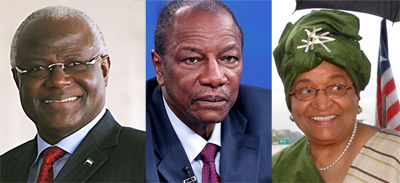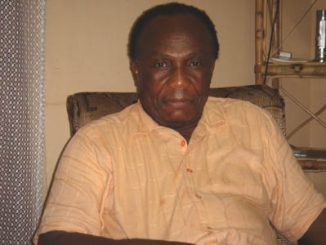
By Mouctarr Bah :
The head of the World Health Organization and presidents of the west African countries suffering the world’s worst-ever Ebola outbreak met in Guinea on Friday to launch a $100 million emergency response.
The plan will also bolster efforts to prevent and detect suspected cases, urge better border surveillance, and reinforce WHO’s sub-regional outbreak coordination centre in Guinea.
The meeting came after Dubai’s Emirates became the first global airline to announce it was suspending flights to the stricken area while the United States, Germany and France issued warnings against travel to the three African countries.
“It is like fighting a forest fire. If you leave behind even one burning ember, one case undetected, it could reignite the epidemic,” said Tom Frieden, the chief of the top US public health body.
Meanwhile Nigeria quarantined two people who had “primary contact” with a man who died of Ebola in Lagos last week as west Africa battled to tame the outbreak.
Guinea, Liberia and Sierra Leone are struggling to contain an epidemic that has infected more than 1,300 people since the start of the year, hit major cities and sparked alarm over its possible spread to other nations.
The WHO raised the death toll by 57 to 729 on Thursday, announcing that 122 new cases had been detected between Thursday and Sunday last week.
Sierra Leone’s leader Ernest Bai Koroma has announced a state of emergency, quarantining Ebola-hit areas and cancelling foreign trips by ministers, while Liberia has closed all of its schools and put government workers on leave.
‘Nearing catastrophe’
Liberian President Ellen Johnson Sirleaf warned ahead of the summit that the crisis was “nearing a catastrophe” and appealed for more doctors and supplies.
Early denial about the dangers of the contagious disease among Liberians has now “turned into fear and panic” she told the CNN news network.
“There are dead bodies all over the place and they now know that it’s real. They know that it’s deadly and they are now beginning to respond,” Sirleaf said.
The summit marks the first time heads of state in west Africa have met specifically to discuss a joint response to the crisis, although Ebola has come up at a previous regional meeting.
As a member of the Mano River Union bloc which groups the nations, Ivory Coast is also represented, by Health Minister Raymonde Goudou Coffie, although it has yet to register any Ebola cases.
The virus, which has no vaccine, causes severe muscular pains, fever, headaches and, in the worst cases, unstoppable bleeding.
It has killed around two-thirds of those it has infected since its emergence in 1976, with two outbreaks registering case fatality rates approaching 90 percent.
The death rate in the current outbreak is a lower-than-average 55 percent, but it is unprecedented in terms of geographical spread and has killed by far the most people.
Fears that it could spread to other continents through air travel have been growing, with European and Asian countries on alert alongside African countries outside the Ebola crisis zone.
In Britain, Sierra Leone cyclist Moses Sesay was quarantined and tested for Ebola at the Commonwealth Games in Glasgow, before being given the all-clear, the athlete told a British newspaper.
Leading medical charity Doctors Without Borders warned the crisis would only get worse and said there was no overarching strategy to handle the outbreak.
The US Peace Corps announced earlier this week it was pulling hundreds of volunteers from Guinea, Liberia and Sierra Leone.
Elsewhere in Africa, Kenya, Ethiopia and Democratic Republic of Congo, home to some of the continent’s largest transport hubs, said they had enhanced screening at border points and airports.
Pan-African airlines Arik and ASKY have halted flights to and from Liberia and Sierra Leone, while Asia-Pacific nations from Hong Kong to Australia have announced tighter security measures at airports, some warning against travel to the Ebola-hit countries.




Leave a Reply